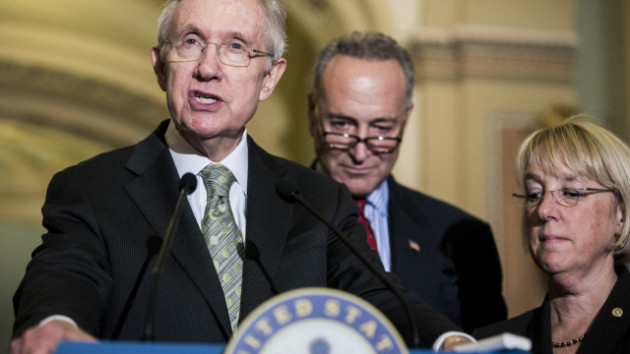Senate Democrats Back off New Iran Sanctions Legislation
As if on cue, Iranian President Hassan Rouhani trumpets how the Islamic Regime won big time with the announced Joint Plan of Action (JPA) implementation last Sunday in Geneva. As The Guardian noted in a report, “Iran nuclear deal means ‘surrender’ for Western Powers, says Rouhani”:
Speaking on Tuesday in the oil-rich province of Khuzestan, Rouhani said the “Geneva deal means the surrender of big powers before the great nation of Iran”.
Perhaps one of those victories is the ability of the Islamic regime to pursue what we would call the “nth” development of new, more efficient centrifuges to enrich uranium. Enrichment for only one purpose, to produce fissile material for nuclear weapons. The Obama White House confirmed that Iran has been allowed to pursue ‘centrifuge research’. The Washington Free Beacon noted this White House news conference call exchange in an article,” Iran permitted to continue advanced nuclear research”:
Asked by a reporter on a conference call if the deal stops “Iran from designing new types of centrifuges,” a senior administration official admitted that the deal does not prohibit this activity.
[…]
“So what’s the practical effect of this R&D [research and development] clarification that you labored over so hard? What does it preclude them from doing?” the reporter asked.
“It—I mean, their commitment is to continue their current enrichment R&D practices, and those are the practices that are laid out in the November [IAEA} Director General’s report,” said one of two senior administration officials on the press briefing. “This—that’s been documented, and that’s what they were—that’s what they will continue to do.”
As we had reported in an Iconoclast post on possible veto-proof bipartisan Iran sanctions legislation in the US Senate (S1881) that the centrifuge research issue had allegedly hit a snag.
Now in the wake of Rouhani’s speech yesterday in Iran comes word that the White House is soft peddling the Iranian President’s trumpeting of this alleged “victory”. An AFP article, “White House plays down Rouhani crowing on Nuclear Deal” notes these comments by White House spokesperson Jay Carney at yesterday’s press conference:
It is not surprising to us and nor should it be surprising to you that the Iranians are describing the agreement in a certain way towards their domestic audience. It does not matter what they say, it matters what they do.
Problem is it could thwart the Obama Administration’s campaign to stifle new bi-partisan sanctions legislation , the Nuclear Weapons Free Iran Act (NWFIA), S1881.
However, under White House threat to veto NWFIA, Sen. Majority Leader Harry Reid ,according to a report from The Weekly Standard, has blocked bringing the measure up for a floor vote. Note these comments from Reid, Democrat Senators and Minority Leader McConnell in The Hill report, “Dems back away from Iran sanctions legislation”:
Senate Majority Leader Harry Reid (D-Nev.) said Tuesday he wanted to “wait and see how this plays out” before moving forward with a vote on the sanctions. Reid declined to say when he might bring the bill, which has 59 co-sponsors, including 16 Democrats, to a vote.
The majority leader noted 10 of his committee chairmen are opposed to the bill.
“We believe we ought to have that vote,” Senate Minority Leader Mitch McConnell (R-Ky.) said Tuesday. “We’re going to continue to press the majority leader to allow a vote on an issue that obviously enjoys the support of a very large bipartisan majority here in the Senate.”
“I think the Iran sanctions bill is meant to strengthen the president, not in any way impede the ongoing negotiations, which should and hopefully will be successful,” Sen. Richard Blumenthal (D-Conn.), a Menendez-Kirk co-sponsor, told reporters Tuesday. “So as long as there’s progress, and as long as the progress is meaningful and visible, there may not need to be a vote.”
Sen. Ben Cardin (D-Md.), another co-sponsor, said both the administration and Congress wanted to reach a diplomatic solution through negotiations on Iran’s nuclear program, if that was possible.
“As far as trying to work out with the administration a strategy so we have more harmony, let’s talk about it,” Cardin said. “So I think that’s what’s going on right now.”
Prior to the November 24th announcement in Geneva of the P5+1 interim agreement with Iran, Reid had backed new sanctions legislation according to a report in the Los Angeles Times on November 21, 2013.
Yesterday, an Endowment for Middle East Truth (EMET) conference call on Iran’s intentions over its nuclear program featured former Israeli Ambassador (ret.) Yoram Ettinger and Dr. Michael Ledeen of the Washington, DC-based Foundation for the Defense of Democracies. Dr. Ledeen is an impassioned advocate for both sanctions and support for regime change via what he argues could be a significant Iranian opposition. Amb. Ettinger suggested that perhaps something more is required, when he commented:
Only one option to avoid facing an Iran which could become an uncontrollable strategic apocalyptic threat. That option is surgical, devastating, disproportional military preemption against Iran’s nuclear infrastructure.
EDITORS NOTE: This column originally appeared on The New English Review.


